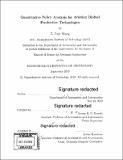Quantitative policy analysis for aviation biofuel production technologies
Author(s)
Wang, Z. Juju(Zhishen Juju)
Download1144177523-MIT.pdf (3.330Mb)
Other Contributors
Massachusetts Institute of Technology. Department of Aeronautics and Astronautics.
Advisor
Steven R. H. Barrett.
Terms of use
Metadata
Show full item recordAbstract
This paper quantifies the impacts of various policy options on the economic viability of six aviation biofuel production technologies. The pathways considered are isobutanol to jet from corn grain, hydroprocessed esters and fatty acids (HEFA) from inedible fats and oils (IFO), HEFA from palm fatty acid distillate (PFAD), synthesized iso-paraffins (SIP) from sugarcane, Fischer-Tropsch (FT) gasification and synthesis from municipal solid waste (MSW), and micro FT from wood residues. The policies considered include feedstock subsidies, capital grants, output based incentives, and a number of policies intended to reduce project risk. Stochastic techno-economic analysis (TEA) models for each pathway are used to quantify the impact of the policies on the median and probabilistic distribution of project net present value (NPV), and minimum selling price (MSP) of the resulting middle distillate fuel products. The policies of interest were layered on top of each baseline TEA model and the relationships between total policy costs and pathway NPVs were determined. The findings of this work show that on average, in the absence of any policies, none of the technology pathways studied are financially viable. In addition, the magnitude of various policy options to achieve economic viability, or 'breakeven', are calculated: the required policy ranges from a total cost of 35 to 337 million USD, equivalent to an output subsidy of approximately 0.07 to 0.71 USD/liter. At the same time, our analysis demonstrates that the cumulative impact of multiple policies on the magnitude of real-world examples could result in economically viable aviation biofuel production.
Description
Thesis: S.M., Massachusetts Institute of Technology, Department of Aeronautics and Astronautics, 2019 Cataloged from PDF version of thesis. Includes bibliographical references (pages 49-52).
Date issued
2019Department
Massachusetts Institute of Technology. Department of Aeronautics and AstronauticsPublisher
Massachusetts Institute of Technology
Keywords
Aeronautics and Astronautics.